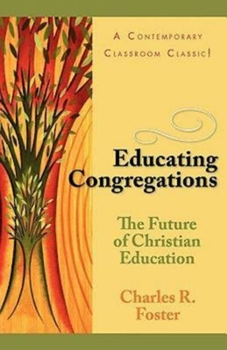Educating Congregations
Select Format
Select Condition 
Book Overview
A leading Christian educator offers a practical guide for revisioning a church's educational program. After identifying the weaknesses in current education programs, Charles Foster offers an alternative vision that is more cooperative, more attentive to the whole of the congregation's life, and that helps people critically correlate the Bible and Christian tradition to their own experience.
Format:Paperback
Language:English
ISBN:0687002451
ISBN13:9780687002450
Release Date:October 1994
Publisher:Abingdon Press
Length:160 Pages
Weight:0.53 lbs.
Dimensions:0.5" x 5.6" x 8.5"
Customer Reviews
2 ratings
Educating everyone
Published by Thriftbooks.com User , 19 years ago
We used Charles Fosters' book in our Christian education class at my seminary. At the heart of this book is an extended project of congregational analysis, designed to be done by an individual or by a group to assess the way things are currently done in one's congregation or educational setting, and calling upon the reader to reflect on how things should be based upon real, factual observations of the situation. Foster looks at education in congregations on both a theoretical and a practical format. His first chapter looks the flaws he has identified in church education - lack of known history (corporate memory), irrelevance of teaching from the Bible (echoes of Barthian critiques here), a shift (Foster's word is 'subversion') from educational goals to pastoral/psychological/therapeutic models, an enshrinement of the status quo, and the lack of cohesive, comprehensive strategy in education. In the American religious history, a transition has taken place whereby it was once true that the majority of congregation members would know the Bible and something of their denominational/communal history from sources outside the church (family, school, etc.), but that this is no longer true. Foster looks at ways to build greater participation and community in the educational offerings of the church, which must mean more than one hour per week on Sunday mornings. Building relationships, making meaning from shared stories and texts, and looking past the malaise and despair that takes hold of some congregations (as they become embattled and reactive to events outside the church in the world, and sometimes to events inside the church. Educating Congregations is a book that should be read by everyone in the congregation, not just the pastor or the Sunday school coordinator. One of the Foster's primary issues, running through the whole text in different ways, is that the education of the congregation is the responsibility of the entire congregation, and each member has a role in this. Education is not something simply 'done' to the members of the congregation, but rather education should be active engagement between all the people, all bringing their gifts as individuals to fit into a comprehensive vision of community. It is a tall order, but one that is achievable. Foster's text is very accessible and interesting, complete with academic grounding and full of personal stories and examples that make the principles come alive for the reader.
Helpful anaysis of the state of religious education .
Published by Thriftbooks.com User , 26 years ago
Charles R. Foster, Educating Congregations: The future of Christian Education, Nashville: Abingdon Press, 1994. 160 pages. ISBN 0-687-00245-1Reviewed by Ted WithamEducating Congregations is a hopeful voice for a Church that could easily lose its way in the "pluralistic and technological global village". (p. 11) It begins by acknowledging that the cup which used to hold the future of the Church is cracked. Foster argues that church education needs to be corporate, because it is only in community that we can nurture Christian faith, identity and vocation. He advocates an "incarnate" style of education.I found helpful Professor Foster's analysis of contemporary flaws in Christian education.1. We do seem to have lost our corporate memory, and are increasingly paralysed in our attempts to make connections with the next generation. We share too tiny a story of background with young people for them to explore with us.2. Our Bible teaching does seem irrelevant, in the sense that many people have been part of our churches and their educational programmes for decades and yet they have not had their real questions answered.3. Our Christian education goals do seem to have been subverted for therapeutic or even marketing purposes. The most severe implication of this is that Christian education has come to mean providing "programmes" for the children and a narrow group of adult "learners", rather than fostering the growth of all the congregation in the love and knowledge of God.4. It does appear that the Church continues to be held in "cultural captivity", subtly endorsing conventional secular values or political correctness, unable to make a Gospel critique of the culture.5. And in the past few years, we do seem to have seen the church's educational strategy collapse. Times have changed: computers and television have brought about systemic changes in our lives; in al denominations, the central support of congregations for Christian formation has been drastically curtailed, and market for! ces drive curriculum choices and changes.Into this challenging scenario, Charles Foster brings hope. Education, he says, consists in preparation for events, engagement in them, and critical reflection on them. He discerns different kinds of events in a congregation's life suitable for this "event-full" education. He names them paradigmatic (those that pattern the basis of our common life), seasonal, and occasional.Foster makes an attractive case that if a congregation attends seriously to the normal events in its life, it will be engaged in effective education of its members. It may well choose to continue to use existing programmes and processes, like EFM or set Sunday School syllabuses, but not as an end in themselves. Foster cites a church in which the members prepare for the seasons by extensive study of pertinent biblical texts and the traditions. This exhaustive process lasts months. This strategy can help a congregation build community, make meaning, and nurture its






